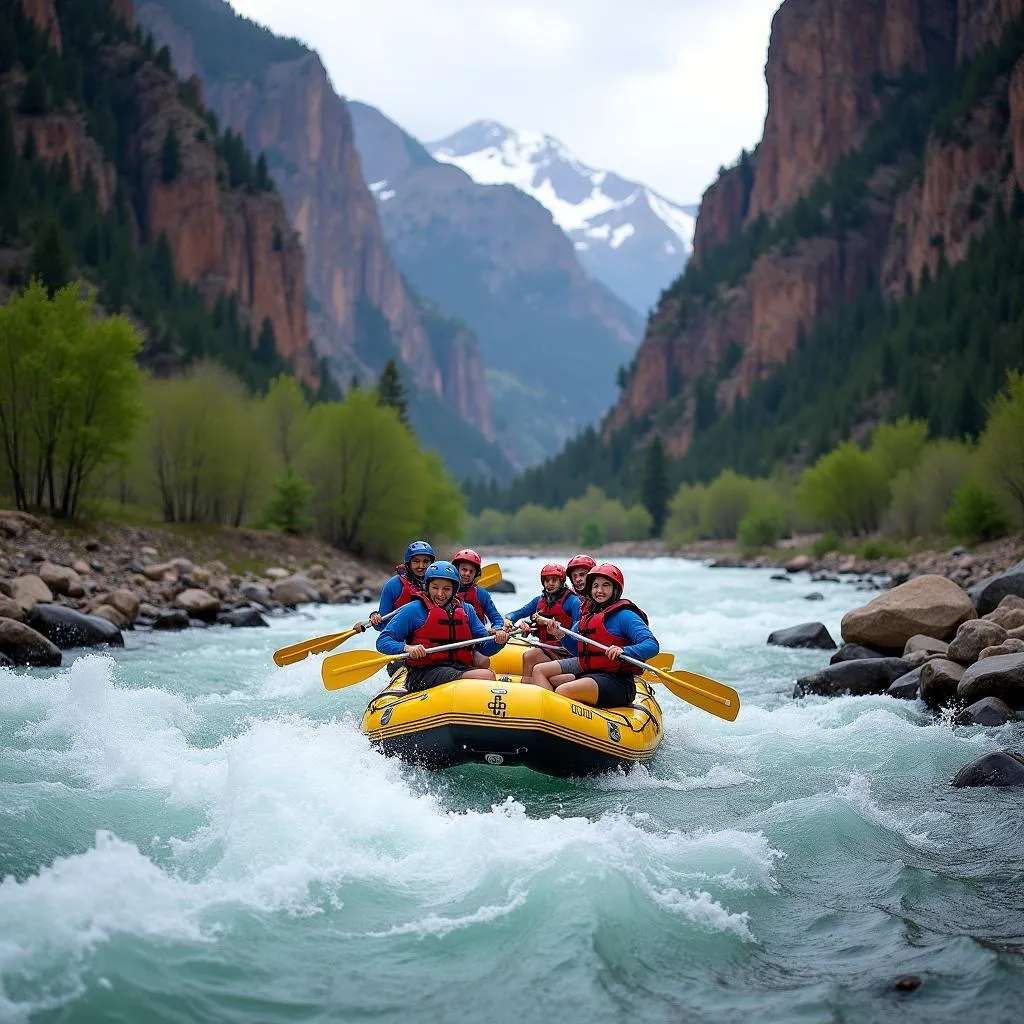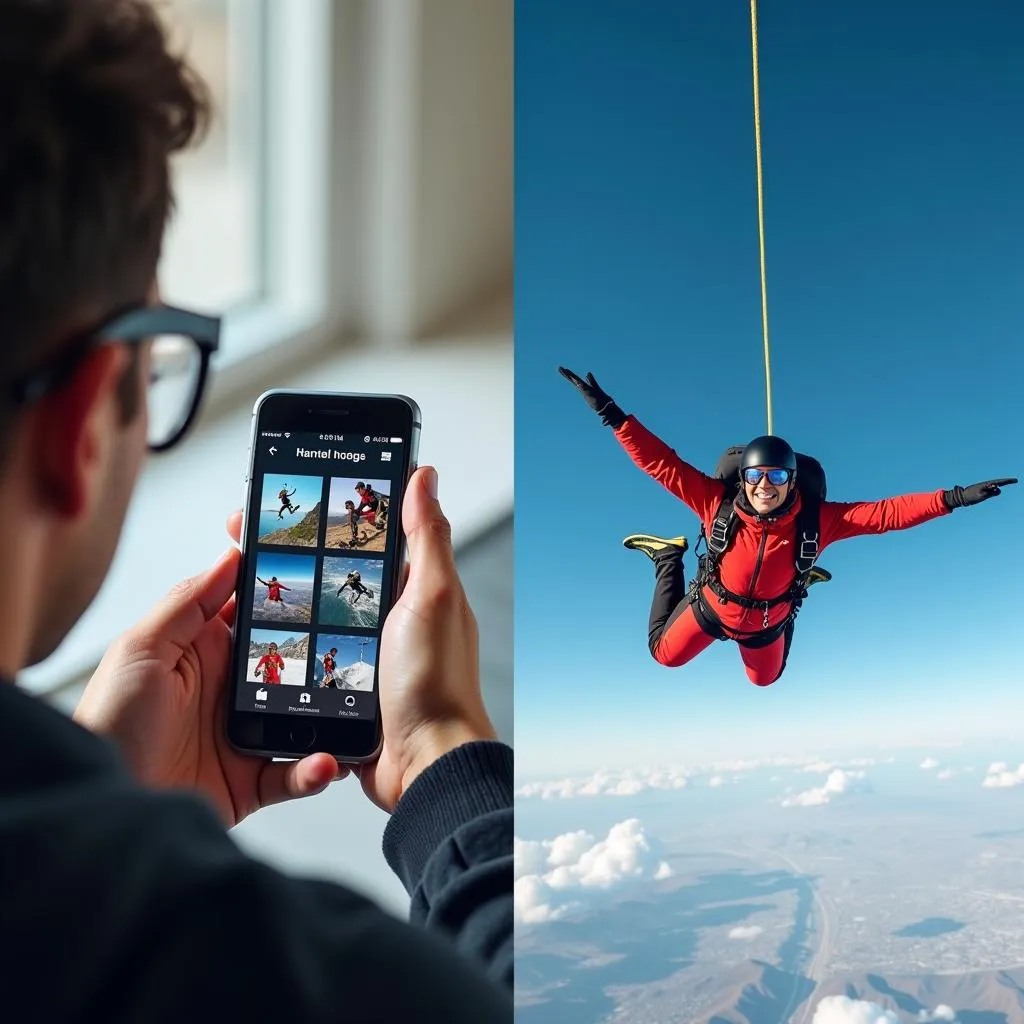IELTS Speaking examiners often ask candidates to describe an exciting experience they’ve had. This topic allows test-takers to showcase their vocabulary, fluency, and ability to narrate past events. Let’s explore how to effectively answer this question and achieve a high band score.
Nội dung bài viết
Part 1: Introduction and Interview
In Part 1, the examiner may ask general questions about exciting experiences. Here’s a sample question with a suggested answer:
Q: Do you enjoy trying new and exciting things?
A: Absolutely! I’m always eager to step out of my comfort zone and experience new adventures. Whether it’s trying exotic cuisines or embarking on thrilling outdoor activities, I find that pushing my boundaries helps me grow as a person and creates lasting memories.
Part 2: Long Turn
Here’s a sample cue card for this topic:
Describe something exciting that you did
You should say:
- What you did
- When and where you did it
- Who you did it with
- And explain why it was exciting for youSample Answer (Band 6-7)
I’d like to talk about an exciting experience I had last summer when I went white-water rafting for the first time. It was during a family vacation to Colorado in the United States. We decided to try this adventurous activity as part of our trip to the Rocky Mountains.
I went with my parents and older brother. We joined a guided tour organized by a local adventure company. The rapids were quite challenging, and it was thrilling to navigate through the fast-moving water. There were moments when I felt a bit scared, but our experienced guide helped us feel safe.
What made it exciting was the adrenaline rush I felt as we paddled through the rapids. The combination of beautiful scenery and the physical challenge of controlling the raft made it a memorable experience. It was also exciting to do something I had never done before and to overcome my fears of the powerful river.
Sample Answer (Band 8-9)
I’d like to recount an exhilarating experience I had last summer when I embarked on my first white-water rafting adventure. This pulse-pounding activity took place in the picturesque Rocky Mountains of Colorado, United States, during a family vacation that was designed to push us out of our comfort zones.
My parents, older brother, and I opted for a guided tour offered by a reputable local adventure company. As we set out on the tumultuous river, I was immediately struck by the raw power of nature. The class IV rapids we encountered were both intimidating and invigorating, requiring our full concentration and teamwork to navigate safely.
What made this experience particularly exciting was the perfect blend of adrenaline-fueled moments and serene interludes. The juxtaposition of calm stretches, where we could admire the breathtaking landscape, and intense rapids that demanded our utmost skill and coordination, created a thrilling roller coaster of emotions.
Moreover, the experience was heightened by the sense of accomplishment I felt after successfully conquering each rapid. It was a tangible demonstration of my ability to overcome fears and rise to challenges. The camaraderie developed with my family and our guide, as we worked in unison to tackle the river’s obstacles, added an extra layer of excitement to the adventure.
This white-water rafting experience was not just physically invigorating but also mentally stimulating. It pushed me to my limits, teaching me valuable lessons about resilience, teamwork, and the sheer joy of embracing new challenges. The vivid memories of that day continue to fuel my enthusiasm for seeking out new and exciting experiences.
 Exciting white-water rafting in the Rocky Mountains
Exciting white-water rafting in the Rocky Mountains
Follow-up Questions
- How did you prepare for this activity?
- Would you recommend this experience to others? Why or why not?
Sample Answer (Band 6-7):
-
We did some research online about white-water rafting and made sure we were physically fit. We also listened carefully to the safety instructions given by our guide before starting.
-
Yes, I would definitely recommend it. It’s a great way to challenge yourself and enjoy nature at the same time. However, I’d suggest that people make sure they’re comfortable in water first.
Sample Answer (Band 8-9):
-
Our preparation was multifaceted. We conducted thorough research on white-water rafting techniques and safety measures. Additionally, we engaged in cardiovascular exercises to enhance our stamina. Prior to the excursion, we attentively absorbed the comprehensive safety briefing provided by our experienced guide, ensuring we were well-versed in proper procedures and potential risks.
-
I would wholeheartedly endorse this experience to others, with some caveats. It offers an unparalleled opportunity to test one’s limits and forge a deeper connection with nature. The sense of achievement and team bonding are truly invaluable. However, I would strongly advise potential participants to assess their comfort level in water and their physical fitness beforehand. It’s crucial to approach the activity with respect for its challenges and to prioritize safety above all else.
Part 3: Two-way Discussion
Q: Do you think people are becoming more interested in extreme sports? Why or why not?
Sample Answer (Band 6-7):
Yes, I believe people are becoming more interested in extreme sports. This might be because of social media, where we often see exciting videos of these activities. Also, as our daily lives become more routine, people look for thrilling experiences to break the monotony. However, it’s important to remember that these sports can be dangerous and require proper training.
Sample Answer (Band 8-9):
I concur that there’s a discernible trend towards increased interest in extreme sports. This phenomenon can be attributed to several factors. Firstly, the ubiquity of social media has exponentially increased exposure to these activities, often romanticizing the thrill and adventure associated with them. Visually stunning content featuring extreme sports tends to go viral, further fueling curiosity and aspiration.
Secondly, in our increasingly structured and digitized world, extreme sports offer a tangible escape and a means to reconnect with our primal instincts. They provide a stark contrast to the sedentary nature of many modern professions, allowing individuals to push their physical and mental boundaries in ways that their day-to-day lives may not allow.
Moreover, the psychological benefits of engaging in high-risk activities, such as enhanced self-esteem and a sense of accomplishment, are becoming more widely recognized. This newfound appreciation for the mental fortitude required in extreme sports has broadened their appeal beyond just thrill-seekers.
However, it’s crucial to acknowledge the inherent risks associated with these activities. As interest grows, there’s a parallel need for comprehensive safety measures, proper training protocols, and public education about the potential dangers. Striking a balance between encouraging adventure and ensuring safety will be key as this trend continues to evolve.
 Influence of social media on extreme sports popularity
Influence of social media on extreme sports popularity
Key Vocabulary and Phrases for High Scores
-
Exhilarating /ɪɡˈzɪləreɪtɪŋ/ (adj): Making one feel very happy, animated, or elated; thrilling.
Example: The exhilarating rush of skydiving is unlike anything else. -
Embark on /ɪmˈbɑːrk ɒn/ (phrasal verb): To start or begin a journey or enterprise.
Example: We embarked on our adventure with great enthusiasm. -
Pulse-pounding /pʌls ˈpaʊndɪŋ/ (adj): Extremely exciting or thrilling.
Example: The pulse-pounding moment of free-fall was both terrifying and amazing. -
Adrenaline-fueled /əˈdrenəlɪn ˈfjuːəld/ (adj): Characterized by or full of excitement and energy.
Example: The adrenaline-fueled experience left us wanting more. -
Juxtaposition /ˌdʒʌkstəpəˈzɪʃn/ (noun): The fact of two things being seen or placed close together with contrasting effect.
Example: The juxtaposition of calm moments and intense rapids made the experience unforgettable. -
Conquer /ˈkɒŋkə(r)/ (verb): To overcome or successfully deal with (a problem or difficulty).
Example: Conquering my fear of heights was the most rewarding part of the bungee jump. -
Tangible demonstration /ˈtændʒəbl ˌdemənˈstreɪʃn/ (phrase): A clear and concrete example or proof of something.
Example: Completing the marathon was a tangible demonstration of my improved fitness. -
Rise to challenges /raɪz tuː ˈtʃælɪndʒɪz/ (phrase): To respond successfully to a difficult task or situation.
Example: The extreme conditions of the desert race allowed me to rise to challenges I never thought possible.
Describe a sport you play or watch regularly can also provide opportunities to discuss exciting experiences and challenges.
Examiner’s Advice
To achieve a high score in the IELTS Speaking test when describing an exciting experience:
- Use a variety of descriptive vocabulary to bring your experience to life.
- Employ a range of tenses accurately to narrate your story.
- Use linking words and phrases to connect your ideas smoothly.
- Provide specific details and examples to support your points.
- Show enthusiasm in your voice and manner when describing the exciting aspects.
Remember, practice is key. Try recording yourself answering similar questions and listen back to identify areas for improvement. You might also find inspiration by describing a memorable walk or hike you had in nature, which can often be an exciting experience.
By following these guidelines and incorporating rich vocabulary and complex structures, you’ll be well-prepared to describe exciting experiences in your IELTS Speaking test, potentially describing a natural place such as parks or mountains that served as the backdrop for your adventure.


